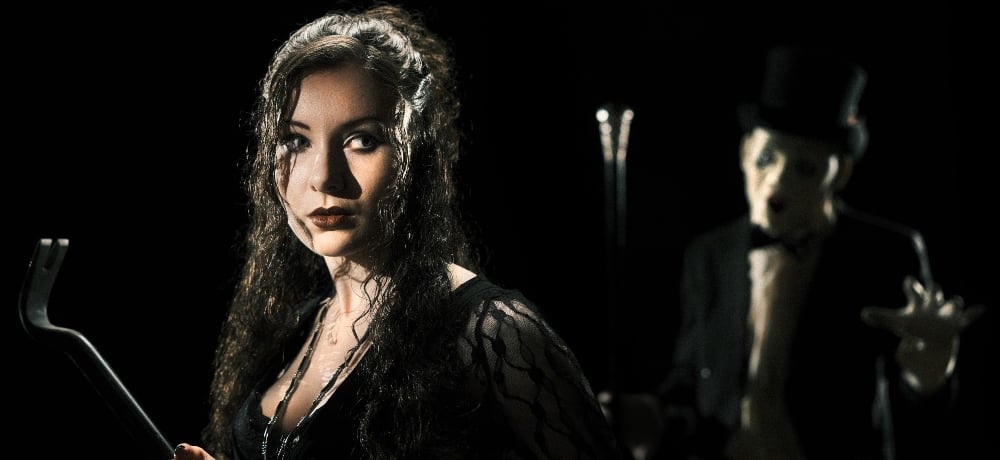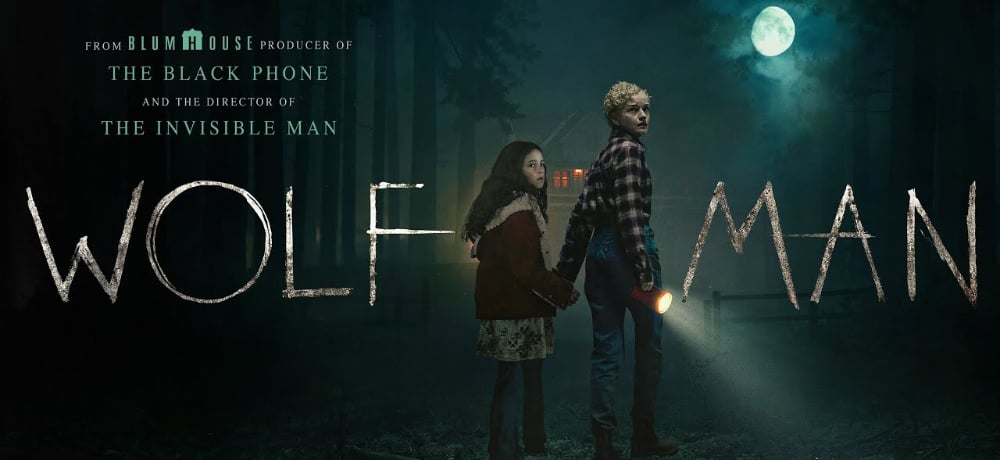






Leigh Whannell is a gifted filmmaker, but Wolf Man is his lowlight. Whannell’s second Universal Monsters adaptation is a werewolf movie in protest. The bones of George Waggner’s 1941 The Wolf Man are exhumed, but Whannell and his wife/co-writer Corbett Tuck strip the remains of meaty storytelling while trying to replicate the character-driven exceptionalities of 2020’s The Invisible Man. Unfortunately, Wolf Man is notably less successful as a creature feature that voids traditional lycan traits for grounded social commentaries, too truncated and no-frills. Differentiation, itself, is not an issue—more how Whannell’s readaptation is dully minimalistic yet simultaneously too off the beaten path. We’re in full-moon Cabin Fever territory bordering on Wrong Turn’s turf, a headscratcher in a title dubbed Wolf Man.
Christopher Abbott stars as Blake Lovell, an estranged Oregonian writer living in San Francisco with workaholic journalist wife Charlotte (Julia Garner) and adorable daughter Ginger (Matilda Firth). Blake clocks his marriage’s dimming spark at the same time he’s served his father’s declaration of death. Grady Lovell (Sam Jaeger) has been missing for ages, but Blake can finally move on. In the package with Grady’s paperwork are keys to his lonesome Pacific Northwest farmhouse, so Blake suggests he, Charlotte, and Meredith spend the summer handling Grady’s affairs—but Blake’s family bonding idea turns nightmarish when they’re attacked and he’s clawed by a wild animal.
Wolf Man unfurls throughout a single night, which favors a spirited pace. Nor does Whannell shy away from early “werewolf” sightings; creature assertions are center stage. These two bullet points should stand out against competing titles that cage their antagonists until the third act, but Whannell’s monstrous take on Marriage Story refuses to settle into any groove. Whannell and Tuck fail to blend underlying themes about familial disintegration into a throat-ripping action-horror scenario, which makes for a lethargic opening before Blake’s moving truck reaches Grady’s driveway. Words are left unspoken during the buildup and beyond, but their silence is hardly deafening—it’s a tonal fusion of mismatching ingredients.
Whannell and Tuck are more interested in Wolf Man’s metaphors for parenthood and stagnant relationships than werewolves, which is a distraction. Their screenplay unleashes the primality of fatherhood and cursed bloodlines, as Blake wrestles to become a protective parent like Grady without the militant-grade outbursts. Abbott courageously plays man and beast in tandem, as his animalistic side clashes with the caretaker who won’t rest until his daughter and wife are safe. Lycanthropy is metaphorical as Blake stops fighting his inner urges and becomes this feral, human-wolf hybrid, but an overbearing emotional thrust clashes against Whannell’s abstract werewolf reinvention. It’s hard to buy into the soapy dramatics of Wolf Man as raw, bloody wounds mirror the film’s hopeful tenderness, more symbolism that lands flat.
Then there’s the “werewolf but not” angle—more a literal “Wolf Man.” Prosthetics designer Arjen Tuiten and makeup designer Jane O’Kane honor Jack P. Pierce’s legendary The Wolf Man model. Abbott’s multi-hour application is “all practical,” and while gruesome tidbits emerge, the decision to treat Blake’s condition like a disease leaves ferocity to be desired. Blake’s transformation is unhurried, pushing gory bits in small doses. The cracking of joints elongates appendages while his face assumes more canine features, most prominently a protruding bottom jaw with fangs, but the result still looks unspectacularly human (by choice). The film’s warring wolves blandly resemble Odet clan inbreds from Wrong Turn more than Lon Chaney Jr.’s hairy hellraiser, and additional details aren’t captivating: Blake’s grainy VFX “Wolf Vision” and his inability to talk, treating Werewolfitus (“Face of the Wolf”) as a backwoods viral infection (another soggy pivot). You can’t refute the craftsmanship on Tuiten and O’Kane’s part—it’s the overall conceptual blueprint that’s amiss. Whannell’s deviation is a red-flag risk that will be divisive at best, and while that gusto of swing is applauded, it’s a failed imagery experiment.
As for bright spots, Abbott’s performance is a standout. The intricacies of Blake’s personality as he transitions from complex human to murderous creature-person are conveyed through Abbott’s eyes, whether his pores are clean or clogged with cosmetic gunk. Julia Garner doesn’t move the needle given her “distant work-life wife” stereotypes nor as a survivalist in Oregon—however, Abbott’s all-in take on Blake’s skeletal remapping, all-fours fighting style, and predatory mannerisms aids her performance. Tuiten and O’Kane excel in skin-crawling bodily horrors as Blake’s figure painfully reconfigures, and Abbott conveys extreme discomfort through screams or muted winces. Matilda Firth does her best cutesy little darling routine even in the face of her snarling papa, which is a pleasant antidote to the film’s darkness in spots, albeit inconsistent. Not to forget how Stefan Duscio’s Americana cinematography works magic with mountain ranges and shadowy corners as Blake silently hunts.
None of that saves Wolf Man from itself. Whannell will bounce back, but that doesn’t erase this neutered, defanged rewriting of horror iconography. He’s missing his directorial swagger, that signature confidence. Wolf Man lacks scares, suspense, and surprises; it’s like a bizarro The Invisible Man. You can sense Wolf Man’s story is soulfully personal for Whannell and Tuck, but sadly, their parental paranoias feel more akin to failed Dark Universe iterations than anything more hopeful.
Movie Score: 2/5